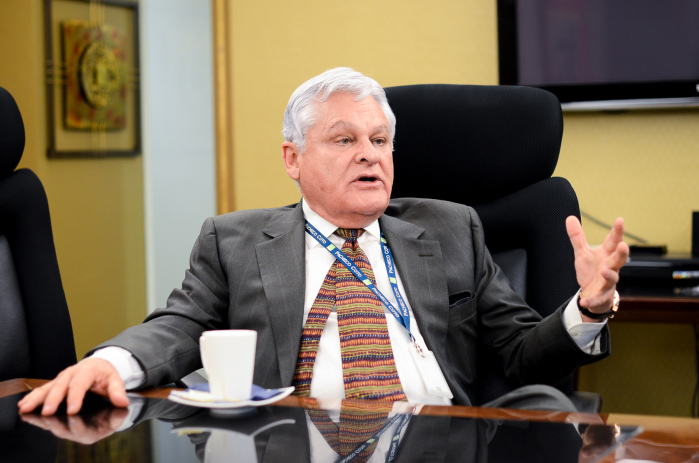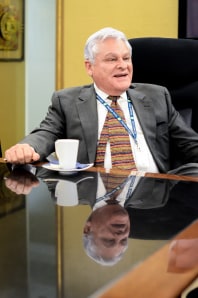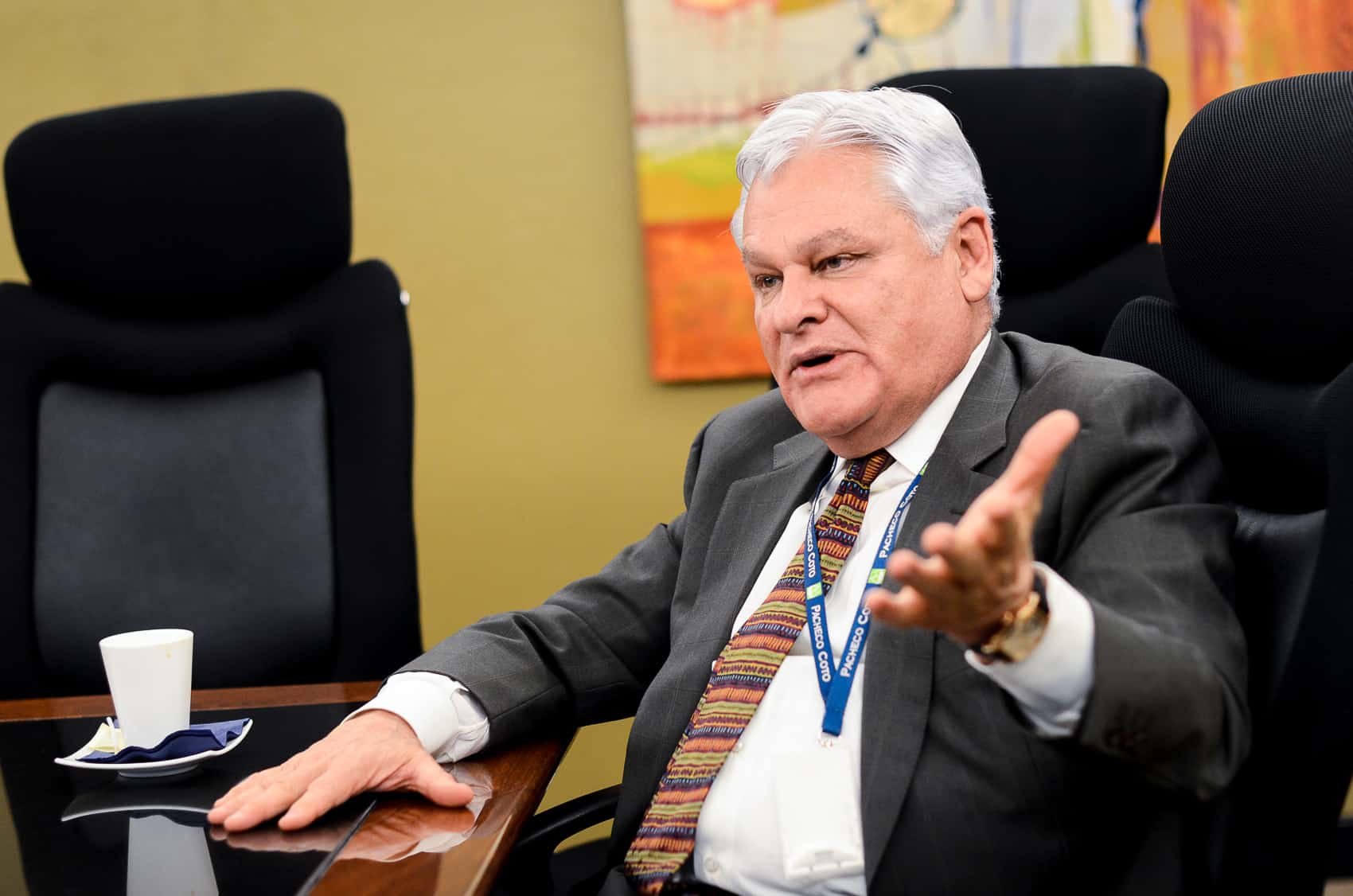The Costa Rican-American Chamber of Commerce (AMCHAM) has a new president; although as one of the original founders of the business chamber, Humberto Pacheco isn’t really new. In fact, he’s been around for quite a while, and many feel he’s well qualified to lead the chamber in the 21st century.
Pacheco, 74, whose father, Humberto Pacheco Coto, founded the oldest operating law firm in the country, was a young guy when the big businessmen of Costa Rica used to meet for lunch as the American Business Council, at the Van Gogh Restaurant. Pacheco, a senior partner at the firm, says he “grew up” with the ABC and stayed on board when it converted to AMCHAM.
He made it all the way to vice president, but back then, rules didn’t allow a non-U.S. citizen to become chamber president. That has since changed.
Pacheco likes to tell the story of the charismatic former president of AMCHAM, Ian Boyle.
“Ian Boyle had served only one of his [two] years as president. And on occasion when the chamber was a little bit under, the nominating committee, which we simpáticamente called the ayatollahs of AMCHAM, decided to bring him back,” Pacheco recalls. “By that time, they had amended the rules and anybody could be president. Ian organized a heck of a party at his home, served tons of Irish whiskey – very good Irish whiskey – and when everybody was very sentimental, to put it one way, he told us he had been called back to the chamber, but with the condition that his board would come back with him.
“And of course, it was a very emotional moment and we were talking history and everybody was pro-going back. Needless to say, the next day I had a double hangover from the Irish whiskey and from having accepted to go back to the board of AMCHAM,” he says.
For many years, the chamber grew, but maintained a low profile. When Pacheco was appointed president in 1995, one of the conditions he set was that he wanted AMCHAM to become a prominent, aggressive chamber. Members traveled to the United States to lobby for a free trade agreement, which in 1995 was “not in the plans of the U.S. because of our size.”
But with the aid of “a lot of very good friends in Congress,” the U.S. decided to enhance Costa Rica’s Caribbean Basin Initiative benefits. At the end, the two-year battle was not completely won, Pacheco says, but it had “pretty good results.”
Later, Pacheco became a member of AMCHAM’s nominating committee, where he served until being tapped again for president this year. One of Pacheco’s selling points, he says, is that AMCHAM members were looking for someone who is not involved with the politicians of this country. But don’t let Pacheco’s claim that he’s “not a politician” fool you: He’s no political outsider, to say the least.
“This time the nomination process was not surrounded by Irish whiskey, it was surrounded by a lot of very serious considerations about the country,” Pacheco says. “So I decided to accept.”
Pacheco served his two-year term in 1995-96 and has since been an advocate of the two-year maxim. Thus, he had serious misgivings about serving a third term and only accepted after the nominating committee convinced him of the need.

Getting back on track
In September 2013, Chambers and Partners of London, the No. 1 lawyer-law firm qualifiers in the world, granted Pacheco their top recognition, the “Lifetime Achievement Award.”
So why would someone who says he’s working more at the firm than he did 20 years ago, take on more responsibility when most people his age are playing golf?
“Every night I have cold shivers in my spine. … I’m chewing a little more than I should. But I think it’s a responsibility that is necessary at this moment in this country, because we have really been going through a very sad process in these last few years, and we have wasted a lot of time,” he says. “We have done a lot of foolish things as a country, and we need to get back on track.”
Among his first tasks: appointing three task forces under the leadership of board members to work on, among other things, politics vis a vis the U.S. and Costa Rica. In his last stint as president, the U.S. and Costa Rica had very good relations, and Washington and San José had a lot of synergy, he says. Over the years, with the U.S. distracted in other regions of the world, and China’s increasing encroachment in Latin America, this has changed.
“It is my intention to go back and try to reconstitute some of that to have support in the U.S., because that’s the only way we’re going to retain some degree of importance as a country and as a chamber,” he says.
With Costa Rica just weeks away from what likely will turn out to be an historic presidential election, politics are going to play an important role in Pacheco’s vision for AMCHAM.
“We are in the process of talking to the two candidates left in this race,” Pacheco says. (The interview with Pacheco took place before ruling party candidate Johnny Araya announced he would no longer continue campaigning, leaving Citizen Action Party candidate Luis Guillermo Solís as Costa Rica’s likely next president.)
“We feel that neither one is going to be anti-foreign investment – that would be a very foolish thing. I can’t see either one doing that, particularly Luis Guillermo Solís, who seems to be the probable option. He’s a very intelligent man, and I think he will have a good presidency if he gets enough support to neutralize the extreme left within the PAC,” he says.
Dealing with political polarization
If the first-round presidential vote in February showed anything, it’s that Costa Rica is increasingly polarized between political actors who lie further to the left than the traditional ruling party and those who have ruled the country for decades.
“There were a lot of young people who were very excited with [the Broad Front Party’s] José María Villalta, because he represented change. He’s a new face, a charismatic, handsome guy giving fresh air to politics. But when [lawmaker-elect] Patricia Mora comes out opening her mouth? She should have taken a long vacation in China or something, because now the young people start saying, ‘Wait a minute, that’s not the Costa Rica I was thinking of. That’s not change. …’
“I’m no political expert, but even the experts were confused. And the polls were a disaster. First there were last-minute changes that the polls could not anticipate, and second, a lot of young people who want change and don’t want anything to do with Liberation had gone with this guy and risen him to the clouds, and all of the sudden they were not with him anymore, because they realized this guy was not everything he promised to be, and he was not very well surrounded. It’s been a crazy run,” he says.
The recent campaign reminds Pacheco of another charismatic figure, Gerardo Wenceslao “G.W.” Villalobos, one of Costa Rica’s historical political characters. (Strangely, G.W. doesn’t yet have a Wikipedia page.)
“G.W. Villalobos was a very picturesque, folkloric character campaigning around the country on horseback, and he got a lot of votes. This reflects the protest votes of Costa Rica, which are not necessarily – by any means – communist,” Pacheco says.
Problems and solutions
Recently, front-running presidential candidate Solís declared he would avoid raising taxes for the first two years of his administration, if elected. He would spend those years cleaning house, removing corrupt bureaucrats and ending wasteful spending that bogs down the economy. But considering Costa Rica’s burgeoning deficit, is this a good idea?
“Totally,” says Pacheco. “I think if this guy [Solís] takes that issue and he really manages to clean house, he’ll go down in history. I’ve heard from an economist in the Finance Ministry who gave us a three-hour lecture on the country’s fiscal problems that left me with the most incredible sensation of impotence, that the privileged groups in the autonomous government agencies have reached levels of privileges that are growing geometrically, whilst even a medium-sized tax raise is a mathematical growth.
“So, how can we catch up? We can’t. Solís has a big task ahead of him. But if he’s serious about it and does something, it would be fantastic,” he says.
There are difficult questions to answer, he adds, among them: “Do you keep paying astronomical severance payments to the Social Security System? Do you keep paying National Oil Refinery employees bonuses for going to work on time? It’s a perspective that is very challenging and not easy for a new president, whomever that is.”
Is four years enough to deal with these issues? “No. I don’t expect any president to resolve all of them in one shot. But if he can resolve the issue of how we are wasting the amount of taxes we are generating – which is very big; in fact this year it is the highest at 21 percent of GDP. Why does a country without an army need any more than that?
“Essentially, this country cannot take more taxes,” Pacheco says. “In times of difficulty, you want private enterprise, the productive sector, as it should be called, to produce more, because that is what is going to generate more taxes. In the good years, we produce a lot of taxes because the production of the entrepreneurial sector is bigger. And this is lacking here very badly. The mentality is to squeeze more taxes out of the paying guys. That is not going to create more jobs. It’s going to create less.”
For Pacheco, the country’s current woes are easy to diagnose: “It’s a combination of incompetence and corruption. Which is worse? I’m not sure.”

Clear rules and foreign investment
“This is one of the things my term at AMCHAM is going to address very strongly,” Pacheco says, referring to foreign investment, the need for clear rules and better infrastructure. “It is very worrying to see lack of direction, yet it’s so simple you could almost sit down and cry. All we need is to improve the law. The current law says I grant you a concession and then it ties you up like a bundle. You have to have a simple operational law, and these things go fantastically.
“But we cannot have a law that to get things granted depends on the will of the president, and to get the country messed up depends on the will of the next president not to do it. We’re facing two huge international indemnifications because that’s what happened in two areas,” he says.
And this is where Pacheco’s ideas might seem controversial to some Costa Ricans. The areas the country desperately needs to develop? Gold, oil, gas and other natural resources.
“I am very strongly an environmentalist, but with common sense. I cannot believe that one single thing in life should take precedence over everything else. And those who are doing that may very well be part of a plot to destroy the economy so the communists can come in. This is always my fear, because this is the policy that communist governments have used everywhere. Damage the country, then it’s so messed up that it’s easy for them to come into power. That is tradition; I’m not inventing that. It’s not a political axiom that came to my mind out of nowhere. It’s a fact,” he says.
He then uses a Costa Rican term to describe those he considers extremists: semáforos, or stoplights. “You know what a semáforo is? The guys who were communists and then turned environmentalists when communism faded away in the Soviet Union.”
For Pacheco, the solutions to Costa Rica’s problems depend on logic. He cites Norway, an oil-producing nation, as “one of the most ecologically minded countries in the world” that can afford “environmental luxuries” because they have oil revenue. “Keeping oil in the ground is only making us poorer,” he argues.
The same can be said for gold. Peru earns millions of dollars from the gold market, and Costa Rica, meanwhile, is facing a multimillion-dollar dispute over the scrapped Crucitas gold mine near the Nicaraguan border.
“I have been claiming, and this is not my idea either, that the secret is not in inventing things, it’s in taking good examples and adapting them here,” he says.
The PLN and Costa Rican nationalization
“My dad was a founding member [of Liberation],” Pacheco recalls, “and I will never forget that he always said the nationalization process was a process of 20 years, to rescue the country at a time when it needed to be rescued, because private enterprise in the country did nothing. He said 20 years. That was 1968.”
Forty years later, “we still have the same system with a few steps forward, all of which have proven absolutely right. When the insurance opened the first year, I got a fire insurance bill for my house that was literally half of what I was paying. I called my insurance agent saying, ‘I think there’s a mistake, you must’ve given me somebody else’s bill,’ and he said, ‘No, now that there’s competition the INS [National Insurance Institute] has decided to lower the policy.’ That means clearly that they were overcharging me for the last umpteenth years.”
The same goes with telecom: “Now I can use my ICE phone in Europe. Before I couldn’t. The thing didn’t work, even if you pulled out the battery and spit on it three times. Nowadays it works. Why? Because now there is Claro and Movistar, and if ICE doesn’t move, they lose their clients. ICE had 100 years to get ready, with their monopoly, and they are not ready. They still aren’t ready.”
The other problem, Pacheco says, is corruption. “The San Ramón highway – when the scandal came and they stopped it, I wrote a column saying that if 40 percent of the [graft] is reduced from the price, it becomes a viable project. … It’s an old game. These guys don’t even do it right.
“Look at the trocha,” the vastly corrupt “emergency” border road parallel to the San Juan River. “The trocha to me is the most shameful thing ever, because on top of desecrating a national hero [Juan Rafael Mora] and a national occasion by naming it, they didn’t put anything into it. I mean zero. They passed the tractor from one end to another, put in a few old furgones as bridges that have now collapsed, and that’s it. And they collected ₡46 billion [$84 million; the actual amount was $44 million], or whatever it was. Staggering.
“And you see some people behind there who you never expected would play the game,” he says. “I can understand some of the ones who are being signaled, but others? I guess they say everybody has a price, and I guess those guys reached it. Some of them don’t even need it, they’re millionaires on their own. Why then?”






